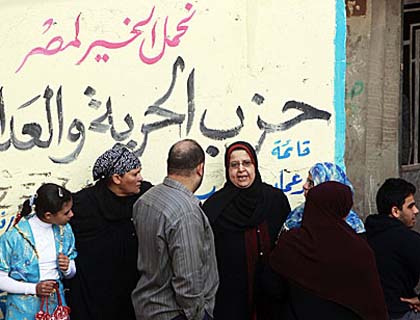These days' reports from Egypt come with surprises. Few days ago, the Supreme Court bought the life offormer President, Mr. Hosni Mobarak and his family members, which fuelled angerand pulled demonstrators back to Tahrir square. They were demanding for deathsentence which finally was not realized. More awkward was thedecision of constitutional Supreme Court lately this week. It rejected theresult of last year's parliamentary election and called for new election thisyear.
However, it was expected that it discredited part of parliamentaryelection, but it completely came as shock for Egyptians as well as foreignerswho closely have set eyes on the political process of the country. Meanwhile, it supported the nomination ofAhmad Shafiq, a former military chief and the last prime minister in Mobarak'sregime. Though the body has authority to cancel the result of election, theannouncement has come too late and everybody deemed the profile of last year's parliamentary election closed. It could be opened when there is a need for areference to hold other elections with much transparency.
The opposition politicalparties severely condemned the decision and labeled it as "coup" by rulingmilitary council which is responsible to keep the situation under the controltill the formation of civil and people-oriented government. Responding to the question that whether constitutional Supreme Court is a legal authority to issue such a command, opposition leaders told that members of the court were appointedby former President Hosni Mobarak and so it is an illegal body.
The problem lies inlasting enmity between government and Muslim brotherhood and other radicalIslamic political parties, particularly, Salafis who openly preach forestablishment of Sharia-based government whose Sharia concept bears completesimilarity to that of Afghan Taliban regime. Former President based his agendaon oppressing the members of Muslim brotherhood and killed and tortured its leaders. SayyedQutb, the founder of Muslim Brotherhood and the strongideologue for political Islam was sentenced to death along with his closefriends.
Since then the party leaders could never rise in the country. Whoever were suspected of clandestineactivities were jailed by the regime. The civil uprising provided the bestopportunity for Muslim Brotherhood to mount pressure on the regime. And bothparliamentary and presidential electionswere the best opportunity to duel withrivaling groups.
From all three above opportunities,the party has done quite well so far. However, demonstrators tried their mostto lead the revolution towards democracy, but Muslim Brotherhood exploited thesituation.
In the parliamentary election,it got more than 40 percent of total votes which set the party at the lead. In thepresidential election, though its competitive nominee was disqualified byelection commission but could manage to put Ahmad Mursi once again ahead of hiscompetitors.
With the current turmoiland national disappointment caused for continuous instability and disruption ofeconomic activities as well as authoritarian commands by different sources ofpower, the prospective is entirely vague.
It is not clear who willwin in the run-off. Previously,demonstrators and other anti-government parties demanded for complete removalof former regime elements. But now thereis no choice for Egyptians. They have to choose between Shariah government and continuance of power of former secular regime with difference, not with HosniMobarak, but with his fellows.
The collapse of theregime which assumed to pave the way for participation of all layers, sects and parties to be part of the political struggle and thesystem, brought about relief to Egyptians and thousands who marched to streets andbeat drums to celebrate the historic day. Now, the post-Mobarak situation istumultuous and the popularity of military which used to hold deep influenceamong people was affected.
In the first round ofpresidential election, from around 50 million Egyptians registered to vote only50 percent took part which is the sign of people's unwillingness to supportPresidential candidates.
However, it should benoticed, in some developed countries with institutionalized democracy, the percentage ofpeople casting their votes in election hardly crossed 50 percent, but thispercentage can be viewed as sign of abnormality because part of philosophy ofcivil uprising in the country was to provide people opportunity to use theirvotes. But they did not do so that also after months of revolutionarymovements.
Another problem in thecountry is victory of Muslim Brotherhood and a former ex-air chief of PresidentMobarak. According the reports, the candidate of Muslim Brotherhood took 25percent of the vote and became the top among candidates, while Ahmad Shafiq,the former ex-air chief followed him with 22 percent of the total vote. Theflip side is that none of them are favored by those who passed nights in TahrirSquare.
Ahmad Shafiq is viewedas an element to former regime and has a military background with a large supporter among military ranks. No doubt he is favored by military which hasthe power in its hand presently and recently there were claims by groups that military had no will to hand over power to a civilian government.
On the other hand,Muslim Brotherhood is known for its radical Islamic background. It already controlsthe parliament and if it wins presidential election too, then the possibility ishigh that he may push the country towards a more religiously intolerant country. IfAhmad Shafiq wins, protestors would not leave Tahrir square soon andinstability would continue and deal severe blow to economy, and start of a newround of evil cycle or self-breading turmoil.

